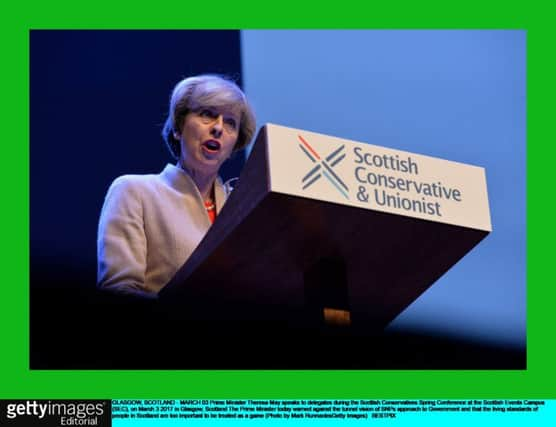Ian Swanson: May speech signals eye on Holyrood powers


Aside from revelling in the Tories’ good showing in last year’s Holyrood elections and looking forward to more success in the council elections in May, the Prime Minister also dwelt on the implications of Brexit and the future of the UK.
But her remarks need careful analysis because they sound like having serious long-term consequences.
Advertisement
Hide AdAdvertisement
Hide AdThis was not a speech where Mrs May offered any concessions or olive branches in recognition of Scotland’s vote to remain in the EU, nor was there much in the way of reassurance for those who might be wrestling with whether to opt for independence if there is another referendum.
Instead she appeared to be warning that when it comes to devolution, there are going to be a few changes around here.
Not only did she make it clear it was wrong to assume that Brexit would mean power over areas like agriculture and fisheries automatically flooding back from Brussels to Holyrood – Mrs May said the “right powers” must sit at the “right level” – but she also seemed to be saying that Scots could find the Westminster government taking a much closer interest in matters north of the Border.
“For too long the attitude in Whitehall has been to ‘devolve and forget’,” she told the delegates in Glasgow. But devolution should not mean “a looser and weaker union”. “We cannot allow our United Kingdom to drift apart.”
Advertisement
Hide AdAdvertisement
Hide AdShe also spoke of building a new “collective responsibility” across the UK, uniting all layers of government.
Mrs May said the UK Government exercised “a responsibility on behalf of the whole UK that transcends party politics and encompasses all aspects of our national life”. And, she continued, while “fully respecting” the devolution settlements, “we must unashamedly assert this fundamental responsibility on our part.
“In those reserved policy areas where we govern directly for the whole United Kingdom, we will explicitly look to the interests of the Union – both the parts and the whole – in our policy-making.
“And in policy areas where responsibilities are devolved, we will look for ways to collaborate and work together with the devolved administrations to improve the outcomes for everyone.”
Advertisement
Hide AdAdvertisement
Hide AdStrip away the positive spin and the message seems clear – the UK Government will in future feel it has a legitimate role to intervene in issues in Scotland if it sees fit.
Who knows where it will lead if a Conservative government with little support in Scotland takes a more activist approach to Scottish matters.
Nicola Sturgeon was accused of scaremongering when she claimed last week that the UK Government was seeking to undermine the foundations of devolution and use Brexit as an opportunity to “rein in” the Scottish Parliament.
But Mrs May’s speech did seem to signal a change in approach.
Advertisement
Hide AdAdvertisement
Hide AdThe Tories repeatedly insist no current powers will be taken away from Holyrood and Brexit will eventually mean at least some more powers – but clearly that is not the whole story.
And observers may conclude there are indeed reasons to be afraid.